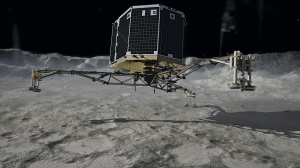 I recently heard that Philae recharged its batteries and reconnected with its creators here on Earth. It reminded me that I listened a few months ago to a radio call-in show about the Rosetta-Philae mission. Many people were upset that 1.6 billion dollars had been spent on such a mission when that money could have been used to solve problems here on Earth. I wondered, “Did these people really believe that all of the problems on Earth could be solved soon and that then we would be ready to begin our trip to the stars?” Did they believe that Utopia, here on Earth, was so close at hand?
I recently heard that Philae recharged its batteries and reconnected with its creators here on Earth. It reminded me that I listened a few months ago to a radio call-in show about the Rosetta-Philae mission. Many people were upset that 1.6 billion dollars had been spent on such a mission when that money could have been used to solve problems here on Earth. I wondered, “Did these people really believe that all of the problems on Earth could be solved soon and that then we would be ready to begin our trip to the stars?” Did they believe that Utopia, here on Earth, was so close at hand?
Utopia is an intensely religious concept. That is to say, what makes an envisioned society into a utopia is that it matches your values and vision. I consider values and vision to be religious choices. If one says that in Utopia there will be no violence, then it is because one does not value violence. But, because values are choices or instinctive reactions, each person will envision a slightly different utopia. This contradicts the very nature of utopias which are societies where many people live together happily. The contradiction might be solved by imagining each person finding others who share their values and visions and gathering together to create their Utopia. This is why Utopia is a religious concept rather than a philosophical one. Philosophy is universal in nature. Philosophy can envision people with like values and visions gathering together to form utopias. But only religions are arbitrary enough to create a specific Utopia that matches the specific values and visions of any particular group of people.
But this leads to a meta-vision of multiple societies living in parallel, each utopic to the citizens who chose it but not to the citizens of its neighbouring societies. These various utopias, no matter how well they are designed internally, may come into conflict with each other over the very values that make them utopic for those who inhabit them. For instance, one utopia, let’s call it Libertariania, may value freedom over all else. Its citizens may use that freedom to pollute the air. Another utopia downwind of Libertariania, might value clean air above all else. Let’s call this second utopia, Puritania. Puritania would be forced to ask Libertariania to restrict Libertarians from polluting the air. If the Puritan government failed to do this, it would no longer be upholding the values of its citizens; it would no longer be a utopia for them. But if the Libertarian government agreed to the Puritan request, then they would no longer be upholding the value of freedom of its citizens; it would no longer be a utopia for them. If the two utopias went to war over the issue, neither would likely remain utopic for long. Freedom would be restricted in order to win the war and air would be polluted by the war.
So the very concept of utopia is an unattainable vision. This is one reason why many religions have placed utopias in the unverifiable world of life after death. As a naturalistic religion, SolSeed cannot place its utopia in such a supernatural place. Instead, we accept that a real utopia must, by its very nature, be at best an approximate fulfillment of our values and visions. Our values include empathy for others, life lived with passion, a wise mindful approach to problem solving, and an ever increasing diversity of Life. We don’t even pretend to have a solution to the internal conflicts between these values. Increased diversity of Life will create more conflict between Life forms; more predation, more parasitism, more competition and none of these relationships leave much room for empathy. Living your Life passionately does not always lead to mindful consideration of problems. We recognize these contradictions and seek no solutions to them. We have faith that solutions will be found that work locally for some period of time and then collapse to later reform into some new construct that again works only locally and only for a limited period of time.
 In essence we consider that we already live in such an approximate Utopia. The variety and grandeur of the Life that surrounds us is proof of this. It matters not that we are intermittently struck with grief and loss as our loved ones die and even as whole species go extinct. We experience these feelings of grief and loss as deeply as anyone. But we also know that they are expressions of the conflict between our values. Immortality would be immoral because it denies the evolution of diversity but empathy demands grief in the face of the loss of loved ones. Feelings of grief and loss are part of the diversity that we consider so valuable.
In essence we consider that we already live in such an approximate Utopia. The variety and grandeur of the Life that surrounds us is proof of this. It matters not that we are intermittently struck with grief and loss as our loved ones die and even as whole species go extinct. We experience these feelings of grief and loss as deeply as anyone. But we also know that they are expressions of the conflict between our values. Immortality would be immoral because it denies the evolution of diversity but empathy demands grief in the face of the loss of loved ones. Feelings of grief and loss are part of the diversity that we consider so valuable.
The part of our vision that seems to make us most unique is the part that calls for the expansion of Sol’s Seed (life on Earth) into space, to create an ever-growing family of living worlds. Sometimes, when we talk about this we are told by others, that rather than spending money on space, shouldn’t we solve the problems on Earth first. It is the same argument that many callers made on the call-in show about Rosetta-Philae. But problems are caused by conflict and as long as various people are working toward different utopias here on Earth, there will be conflict between them. Therefore, we will never solve all of the problems on Earth until the Sun expands into a red giant and burns away all Life on Earth. Only then will there be no conflict and no problems here on Earth.
Others say that until humanity achieves moral perfection it should not spread its dirty self to the stars. To this I say that the dream of moral perfection is an illusion. Morality is like utopia. It is an expression of choices of values. There is no such thing as moral perfection any more than there is such a thing as the perfect flavour of ice cream. If Life spreads to other worlds, and whether or not humanity goes with it, then yes, there will be wars on those other worlds. Yes, there will be atrocities committed in the name of king and country, religion and ideology. And there will be grief and aching feelings of loss. But there will be living creatures there to suffer through those feelings, to console one another and to rebuild and build anew. There will also be living creatures there to love and feel awe and perhaps feel new and wondrous emotions that have yet to evolve.
If we stay here on Earth, self-flagellating and mired in guilt over our “moral imperfection”, we deny all those living creatures the chance to love and feel awe and evolve those new and wondrous emotions which we cannot yet imagine. The Rosetta-Philae mission is just one of the first steps we need to take if we are to give those diverse creatures a chance at Life. If your utopia is one where there is nothing alive to feel grief, then I am sorry but I do not share your vision at all. My utopia is a universe filled with riotous Life passionately living out its conflicts and perhaps learning over trillions of years as stars come and go amongst the riot, to mindfully and wisely solve its problems as best can be. I hope that many more billions of dollars can be found to work toward that utopia.
Well said! I really resonate with this Eric. I’d love to get feedback from others we respect who may have a different perspective on this topic.
The answer to your question in the first paragraph is “no,” those people don’t think we can solve all of Earth’s problems quickly. At best they might agree that it’s possible we could grow our economy and shrink the cost of space travel to the point where someday we could afford to pursue space colonization without taking too many resources away from Earthly concerns. At worst, some of them may just be saying that we will never be able to afford what they see as a frivolous, fanciful, or even immoral project of making homes for ourselves beyond Earth. “This planet is all we will ever have–deal with it.”
Strangely, this is close to what Kim Stanley Robinson says in his new novel Aurora, based on a strangely limited interpretation of evolution that says we could never successfully adapt to living permanently on other worlds. (Possibly he just means that submitting to the long and painful process of natural selection would be immoral, and that we’re not smart enough to use genetic engineering as a viable alternative.)